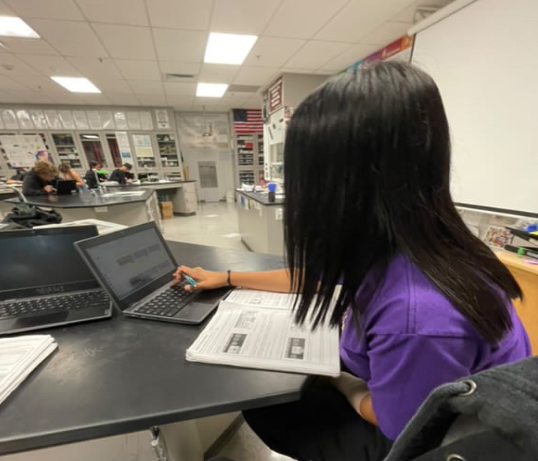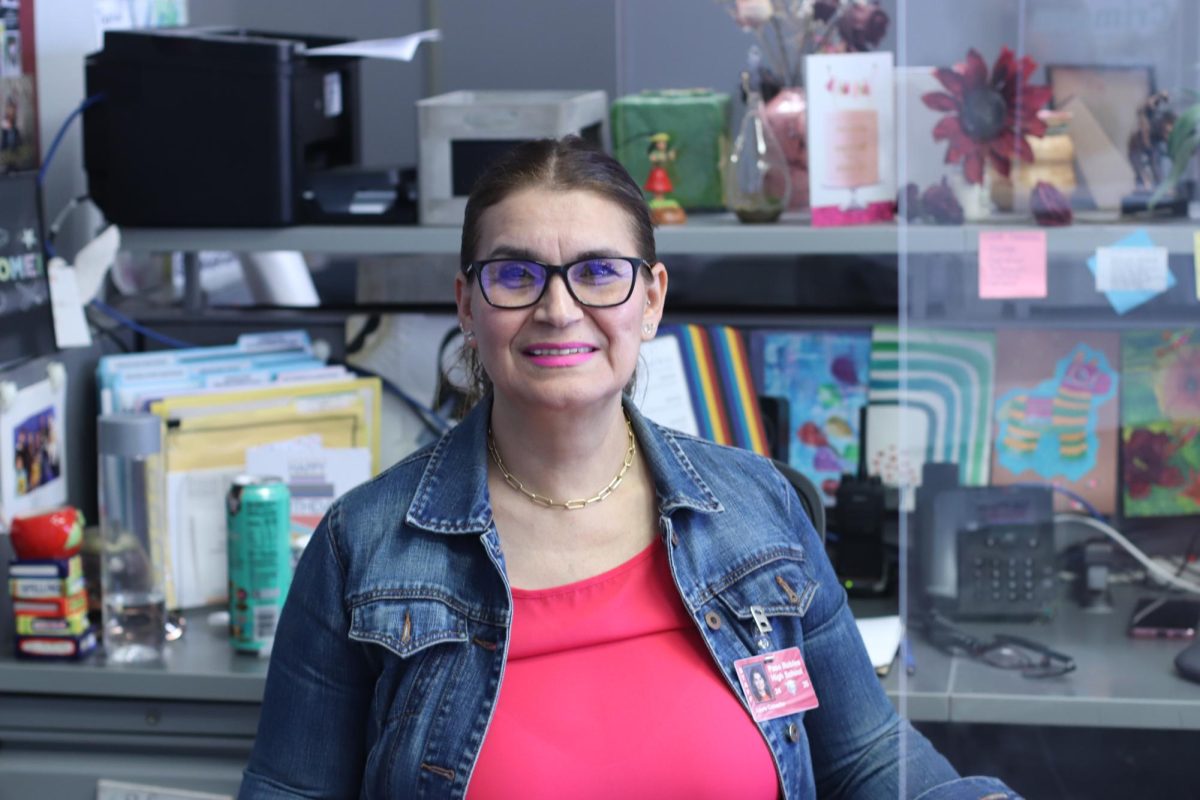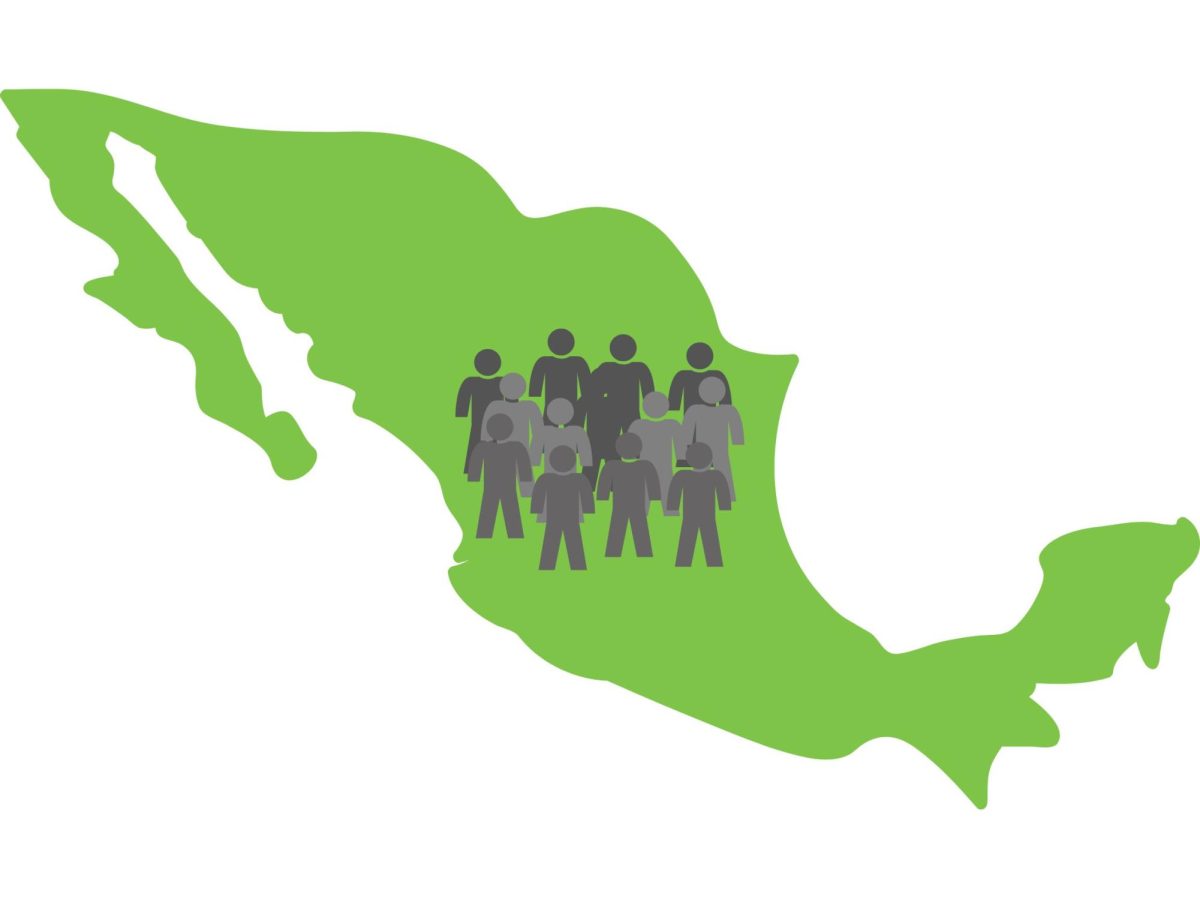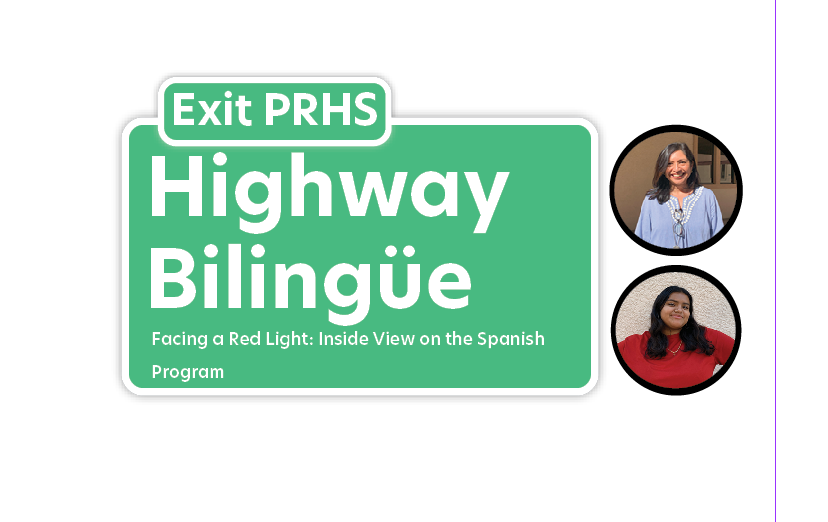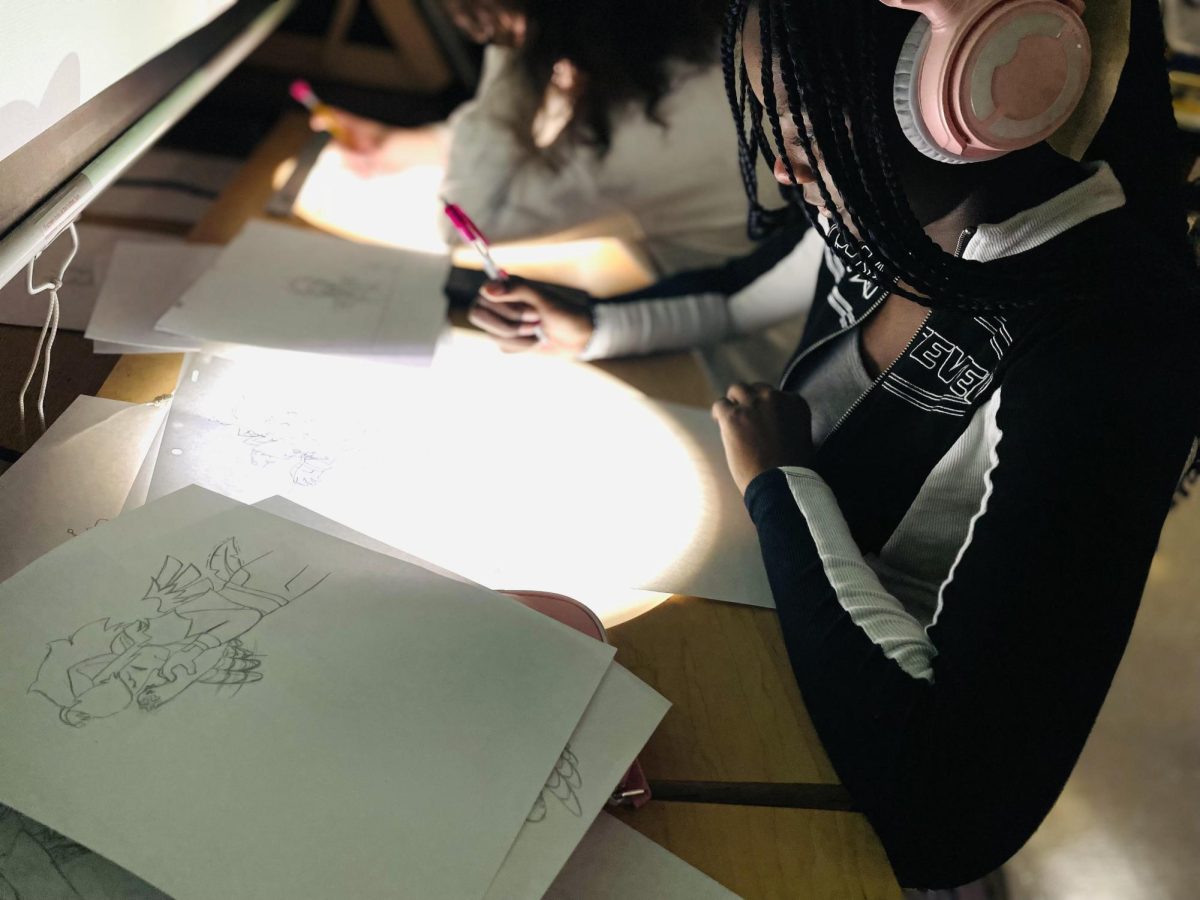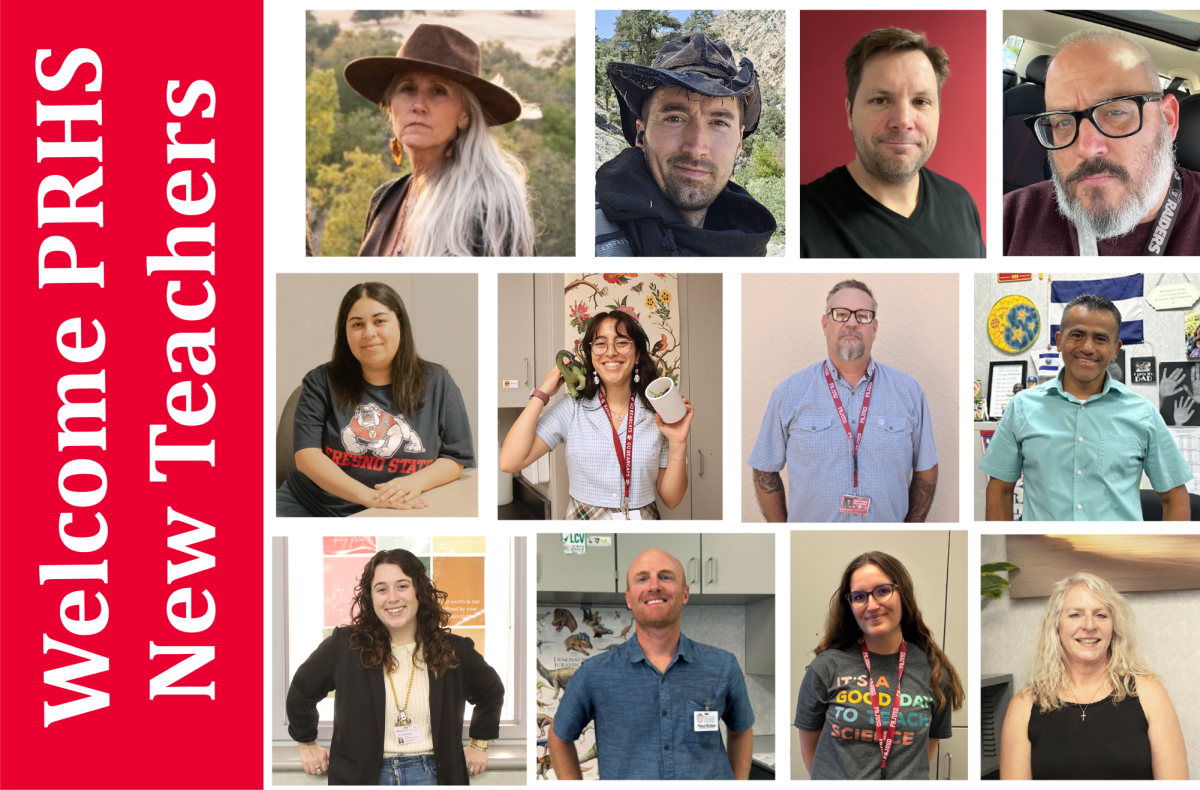Anonymous (Feature Image):
ELD students feel they’re facing their struggles alone as the school ,makes them feel the need to be anonymous
Anonimo (Imagen Destacada):
Los estudiantes de ELD sienten que enfrentan sus dificultades solos, ya que la escuela les hace sentir la necesidad de permanecer en el anónimos.
English
Español
English
Facing Adversity
ELD students share their struggles overcoming language barriers and feeling silenced at school

Sitting in the back of a classroom, hoping not to be called on, waiting for the bell to ring; is the reality for many students at PRHS, but especially for most of the 220 students in the ELD program. Entering high school can feel like a foreign world itself, and for some students, they are entering a foreign country as well.
Adjusting to a new country can be shocking to students as PRHS’ new Bilingual counselor Cesar Barajas said. “One of the biggest struggles is adjusting. I see that they struggle to adjust to the new school system and culture. A lot of these students have their parents in Mexico or other Latin American countries. So a lot of mental health and social-emotional needs come up because they’re missing their home, their friends, their families.” Barajas said.
Inquiring about the ELD student experience at PRHS worked best in Spanish. Females were more willing to share than boys. No one wanted to be photographed.
As junior Alexandra Molina, from El Salvador, enters her fourth month at PRHS, she described her adjustment, ”The school is very different from what I was used to in my country. There it is more technology, and we don’t write much.” The lack of comfort has negatively affected Molina’s views of herself and led to difficulty with speaking up in school.
“I am often embarrassed to speak in English because the pronunciation is very difficult and when you pronounce something wrong, others make fun of it. Instead of making fun of it, I want students to help and talk with us so we can practice and improve.” – Alexandra Molina
The biggest struggle that has been brought up by students in the ELD program is communication as sophomore Sandra Garcia Aparicio, from Mexico, said. “The biggest difficulty at school is being able to communicate with others. Many times for those of us who only speak one language, we are not given the help needed to understand. In my classes, where the teacher doesn’t know any Spanish, I feel a little uncomfortable because I want to say something but I don’t know how to say it. It is very difficult to make friends because most people who speak Spanish do not want to talk to you. And there are some students who only speak English who look at us with eyes of disapproval,” Garcia said.
Freshman Maritza Hernandez, from México, expressed a similar yet different perspective of school life. “My daily life is normal at school, although it makes it very difficult because I don’t know English. It is easy for me to make friends because I am a very social girl and I always try to talk to people.” Yet Hernandez still feels judged by peers. “I see how many people judge others just because they don’t know English, and I want to tell them to not judge people by their physique when you don’t know them as a person.”
While PRHS promotes zero-tolerance of bullying many of these students face it. Jennifer Romero-Vicente shared, “A lot of students make fun of those that are learning English, and I wish that they would put themselves in our shoes and realize that everyone has a starting point to a new language.”
This lack of empathy has been projected by teachers, as well. Romero expressed her difficulties with one teacher: “I had a class once where the teacher wouldn’t let me get out my Chromebook for translations, so I would have to wait till I got home to do work – or they would send me to a different classroom to work by myself and that was really hard.”
However, PRHS is trying to promote a community of equity by helping those that need it and creating modifications so everyone can succeed.
“For other teachers, there are some modifications for the students to help them. We have to speak slower and allow them to use new technologies such as translators,” ELD teacher Florentino Aleman said, who utilizes Chromebooks in his classes daily.
ELD students’ biggest struggles are in English classes. The average grade is a D+ in terms of the ELD population. “Unfortunately, students’ grades are affected because of language barriers, they’re not able to understand the material or communicate their ideas. So it does affect them and that’s one of the reasons they have this class so I can help them improve their grades because they need extra support, especially in English,” Aleman said. A majority of the nearly 100 teachers on campus are not fluent in Spanish and can’t provide the right tools for students – a struggle for many.
“Every student needs to have an equal opportunity to be able to learn content and education system. It shouldn’t matter what their language is.” –Angela Logan
“My struggle is making sure that I’m able to provide students with the opportunity. And it takes more time to translate things. I’m just worried because I don’t speak Spanish fluently, and so I’m unable to really emphasize the concepts for a particular group of students which is really hard for me. Thankfully, I’ve been able to secure paraeducators who are bilingual and that has really helped,” Economics teacher Angela Logan said.
Only two PRHS paraeducators are equipped to translate from English to Spanish, so students often only have a mere handful of their classes with a translator. Yet they are very passionate about what they do. “I became a paraeducator to provide services for students that I didn’t get as an ELD student. There’s a lot we can learn from ELD students.They’re learning about our culture and we can learn a lot about their culture as well. They need extra support because there isn’t enough right now,” paraeducator Maria Segura said.
To combat the shortage of support Barajas wants to have students tutors and guides for newcomers possibly with Leadership students – “just to provide another layer of support and it would be a great idea because now they’re learning at the same time.
Senior Alejandra Flores, from the US, shared her input on what it’s like to help these students during classes and grow closer with them. “I’ve noticed that some kids feel defeated [when learning English],. There’s so much information coming to them in a language they barely know. I know some students who really want to learn and try to learn the material while translating, but there are some who are defeated by it and say it’s too hard. So I think it depends on the mindset you have and how far you want to succeed.”
Flores tries to help these students as much as possible because of personal experience. “Both of my parents are immigrants. My Dad went to Cuesta when I was younger to learn English, and I remember growing up, he was always shy to talk in English so I always had to. And then I kind of got to a point where I said, ‘No, you know it, you can do it.’ And now he is fine with it. I see people in the same position.”
She thinks that though not everyone has the tools to communicate with these students there’s always room for kindness. “For others, I would say that even if you can’t speak Spanish, you can always find a way to help: Google Translate, or, you know, showing them a piece of paper or something. Just try to be friendly. They’re going through tough times,” Flores said.
As ELD students continue to face adversity they show resounding strength and perseverance through overcoming language barriers and feeling silenced by their peers. There is hope for a better future where all students have the services necessary for them to succeed regardless of their language.
Español
Enfrenteando Adversidad
Los estudiantes de ELD comparten sus luchas para superar las barreras del idioma y sintiendo silenciados en la escuela

Sentado en la parte de atrás de un salón de clases, con la esperanza de que no lo llamen, esperando que suene la campana; es la realidad para muchos estudiantes en PRHS, pero especialmente para la mayoría de los 220 estudiantes en el programa ELD. Ingresar a la escuela secundaria puede sentirse como un mundo extranjero en sí mismo, y para algunos estudiantes, también están ingresando a un país extranjero.
Adaptarse a un nuevo país puede ser impactante para los estudiantes, como dijo el nuevo consejero bilingüe de PRHS, César Barajas. “Una de las mayores luchas es adaptarse. Veo que luchan por adaptarse al nuevo sistema escolar y la cultura. Muchos de estos estudiantes tienen a sus padres en México u otros países de América Latina. Así que surgen muchas necesidades socioemocionales y de salud mental porque extrañan su hogar, sus amigos, sus familias”. dijo Barajas. Preguntar sobre la experiencia de los estudiantes de ELD en PRHS funcionó mejor en español. Las mujeres estaban más dispuestas a compartir que los niños. Nadie quería ser fotografiado.
Cuando Alexandra Molina, de El Salvador, estudiante de tercer año entra a su cuarto mes en PRHS, describió su ajuste: “La escuela es muy diferente a lo que estaba acostumbrada en mi país. Ahí hay más tecnología, y no escribimos mucho”. La falta de comodidad ha afectado negativamente la opinión de Molina sobre sí misma y le ha causado dificultades para hablar en la escuela.
“Muchas veces me da vergüenza hablar en inglés porque la pronunciación es muy difícil y cuando pronuncias algo mal, los demás se burlan de ello. s En lugar de burlarme de ello, quiero que los estudiantes nos ayuden y hablen con nosotros para que podamos practicar y mejorar.” -Alexandra Molina
La mayor lucha que han planteado los estudiantes en el programa ELD es la comunicación, como dijo la estudiante de segundo año Sandra García Aparicio, de México. “La mayor dificultad en la escuela es poder comunicarse con los demás. Muchas veces a los que solo hablamos un idioma, no se nos da la ayuda necesaria para entender. En mis clases, donde el profesor no sabe nada de español, me siento un poco incómodo porque quiero decir algo pero no sé cómo decirlo. Es muy difícil hacer amigos porque la mayoría de las personas que hablan español no quieren hablar contigo. Y hay algunos estudiantes que solo hablan inglés que nos miran con ojos de desaprobación”, dijo García. La estudiante de primer año Maritza Hernández, de México, expresó una perspectiva similar pero diferente de la vida escolar. “Mi vida diaria es normal en la escuela, aunque se me hace muy difícil porque no sé inglés. Es fácil para mí hacer amigos porque soy una chica muy sociable y siempre trato de hablar con la gente”. Sin embargo, Hernández todavía se siente juzgado por sus compañeros. “Veo cuántas personas juzgan a los demás solo porque no saben inglés, y quiero decirles que no juzguen a las personas por su físico cuando no las conocen como personas”.
Si bien PRHS promueve la tolerancia cero de la intimidación, muchos de estos estudiantes la enfrentan. Jennifer Romero-Vicente compartió: “Muchos estudiantes se burlan de los que están aprendiendo inglés, y me gustaría que se pusieran en nuestro lugar y se dieran cuenta de que todos tienen un punto de partida para un nuevo idioma”.
Esta falta de empatía también ha sido proyectada por los docentes. Romero expresó sus dificultades con un maestro: “Una vez tuve una clase en la que el maestro no me dejaba sacar mi Chromebook para traducir, así que tenía que esperar hasta llegar a casa para hacer el trabajo, o me enviaban a un aula diferente para trabajar solo y eso fue muy difícil”.
Sin embargo, PRHS está tratando de promover una comunidad de equidad ayudando a quienes lo necesitan y creando modificaciones para que todos puedan tener éxito.“Para otros maestros, hay algunas modificaciones para que los estudiantes los ayuden. Tenemos que hablar más despacio y permitirles usar nuevas tecnologías como traductores”, dijo el maestro de ELD Florentino Alemán, quien utiliza Chromebooks en sus clases todos los días.
Las mayores luchas de los estudiantes de ELD están en las clases de inglés. La calificación promedio es D+ en términos de la población ELD. “Desafortunadamente, las calificaciones de los estudiantes se ven afectadas debido a las barreras del idioma, no pueden comprender el material o comunicar sus ideas. Entonces sí les afecta y esa es una de las razones por las que tienen esta clase para poder ayudarlos a mejorar sus calificaciones porque necesitan apoyo adicional, especialmente en inglés”, dijo Alemán.
La mayoría de los casi 100 maestros en el campus no hablan español con fluidez y no pueden proporcionar las herramientas adecuadas para los estudiantes, una lucha para muchos.
“Todos los estudiantes deben tener las mismas oportunidades para poder aprender el contenido y el sistema educativo. No debería importar cuál es su idioma.” -Angela Logan
“Mi lucha es asegurarme de poder brindarles a los estudiantes la oportunidad. Y lleva más tiempo traducir las cosas. Solo estoy preocupado porque no hablo español con fluidez, por lo que no puedo enfatizar los conceptos para un grupo particular de estudiantes, lo cual es muy difícil para mí. Afortunadamente, he podido conseguir paraeducadores que son bilingües y eso me ha ayudado mucho”, dijo la profesora de economía Angela Logan. Solo dos paraeducadores de PRHS están equipados para traducir del inglés al español, por lo que los estudiantes a menudo solo tienen un puñado de sus clases con un traductor. Sin embargo, son muy apasionados por lo que hacen. “Me convertí en paraeducador para brindar servicios a los estudiantes que no obtuve como estudiante de ELD. Podemos aprender mucho de los estudiantes de ELD. Están aprendiendo sobre nuestra cultura y nosotros también podemos aprender mucho sobre su cultura. Necesitan apoyo adicional porque no hay suficiente en este momento”, dijo la paraeducadora María Segura.
Para combatir la escasez de apoyo, Barajas quiere tener estudiantes tutores y guías para los recién llegados, posiblemente con estudiantes de Liderazgo, “solo para brindar otra capa de apoyo y sería una gran idea porque ahora están aprendiendo al mismo tiempo.
La estudiante de último año Alejandra Flores, de EE. UU., compartió su opinión sobre cómo es ayudar a estos estudiantes durante las clases y acercarse más a ellos. “He notado que algunos niños se sienten derrotados [al aprender inglés]. Les llega tanta información en un idioma que apenas conocen. Conozco a algunos estudiantes que realmente quieren aprender y tratan de aprender el material mientras traducen, pero hay algunos que se sienten derrotados y dicen que es demasiado difícil. Así que creo que depende de la mentalidad que tengas y de hasta dónde quieras tener éxito”.
Flores trata de ayudar a estos estudiantes tanto como sea posible debido a su experiencia personal. “Mis dos padres son inmigrantes. Mi papá fue a Cuesta cuando yo era más joven para aprender inglés, y recuerdo crecer, él siempre fue tímido para hablar en inglés, así que siempre tenía que hacerlo. Y luego llegué a un punto en el que dije: ‘No, lo sabes, puedes hacerlo’. Y ahora él está bien con eso. Veo gente en la misma posición”.
Ella piensa que aunque no todos tienen las herramientas para comunicarse con estos estudiantes, siempre hay lugar para la amabilidad. “Para otros, diría que incluso si no puedes hablar español, siempre puedes encontrar una manera de ayudar: Google Translate, o, ya sabes, mostrándoles una hoja de papel o algo así. Solo trata de ser amigable. Están pasando por momentos difíciles”, dijo Flores.
A medida que los estudiantes de ELD continúan enfrentando la adversidad, muestran una gran fuerza y perseverancia al superar las barreras del idioma y sentirse silenciados por sus compañeros. Existe la esperanza de un futuro mejor donde todos los estudiantes tengan los servicios necesarios para que tengan éxito, independientemente de su idioma.



